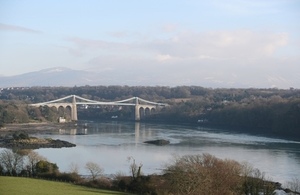Guto Bebb: Eisteddfod at the very heart of Welsh language and culture
UK Government in Wales Minister welcomes festival’s return to Anglesey

Menai Bridge
UK Government in Wales Minister Guto Bebb will join the thousands of people set to descend on Anglesey to celebrate Wales’ culture, its language and its heritage at the National Eisteddfod (4-12 August).
The annual Welsh festival of music and arts will be held on the island for the first time since 1999 and will see over 6,000 people competing in various competitions throughout the week.
Mr Bebb – who is a fluent Welsh speaker – will visit the Eisteddfod on Monday (7) where he will meet with Chief Executive Elfed Roberts, watch performances in the pavilion and visit a range of exhibitors, including BBC Wales and the National Trust.
The Minister will also deliver a keynote speech at a reception at the S4C stand where he will take the opportunity to set out more detail on an independent review of the channel which will look at its remit, the way it is funded and its governance.
UK Government in Wales Minister Guto Bebb said:
The National Eisteddfod is a landmark event on the Welsh cultural calendar. It is one of the world’s greatest festivals and provides a prime opportunity for us to promote our language, our arts and the talents of our people to the rest of the UK and beyond.
Its economic impact on the local area cannot be underestimated. Not only do the businesses, hoteliers and campsites in the host town benefit, it also puts the spotlight on neighbouring areas, and the additional cultural attractions on offer to those planning on visiting Wales this summer.
I am looking forward to joining those heading to Anglesey to take part in the celebrations, and I hope the organisers and all those competing during the week have a very successful Eisteddfod.
The Eisteddfod attracts over 160,000 visitors to the area during the week, boosting the local economy by an estimated £6-8 million over the duration of the festival.
This year’s event will include events and performances to mark the centenary of the bloody battle of Passchendaele where Welsh poet, Ellis Humphrey Evans, known as Hedd Wyn – was killed during the first day of fighting. Hedd Wyn had submitted a poem in the Eisteddfod’s chair competition that year, but died before being told he had won. In the 1917 festival in Birkenhead – a month after his death – a black shroud was placed over the bardic Chair in his memory.
Taking its inspiration from the history of Hedd Wyn and the generation of men who never came home from the War, this year’s National Eisteddfod will open with a special performance commemorating the War, exactly a century later, and through the eyes of the people. The title, A Oes Heddwch? (Is There Peace?), is not only relevant to the War but also to the Eisteddfod and the Gorsedd ceremonies.